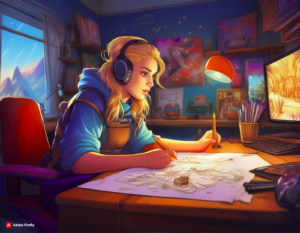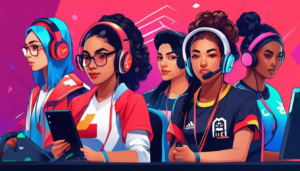Exploring Careers In Gaming: Opportunities For Women In A Thriving Industry
The gaming industry has evolved into a dynamic and expansive field, offering a wealth of career opportunities that extend far beyond playing games. For women in gaming, these careers provide pathways to showcase creativity, technical skills, and leadership. As we strive to build a safe and inclusive community, understanding the various jobs in gaming can inspire and empower women to pursue their passions in this exciting industry.
The Diverse Landscape Of Gaming Careers
The gaming industry encompasses a wide range of roles, each contributing to the creation, distribution, and promotion of games. Here are some key career paths:
Game Design
- Role: Game designers conceptualize and create the mechanics, storylines, and overall user experience of a game.
- Skills Needed: Creativity, storytelling, knowledge of game mechanics, and proficiency in design software.
- Impact: Designers shape the player’s journey, making games engaging and immersive.
Game Development
-
- Role: Developers, or programmers, write the code that brings games to life. They work on everything from gameplay mechanics to graphics rendering.
- Skills Needed: Proficiency in programming languages (such as C++, Java, or Python), problem-solving skills, and attention to detail.
- Impact: Developers ensure that games run smoothly and are bug-free, providing a seamless experience for players.
Art and Animation
-
- Role: Artists and animators create the visual elements of a game, including characters, environments, and special effects.
- Skills Needed: Artistic talent, proficiency in graphic design and animation software, and an understanding of visual storytelling.
- Impact: Visual artists and animators bring the game’s world to life, making it visually appealing and immersive.
Sound Design and Music Composition
- Role: Sound designers and composers create the audio elements of a game, including sound effects, dialogue, and music.
- Skills Needed: Musical talent, audio engineering skills, and creativity.
- Impact: Sound and music enhance the gaming experience, adding depth and emotion to the gameplay.
Quality Assurance (QA) Testing
- Role: QA testers play games in development to identify bugs, glitches, and other issues that need fixing.
- Skills Needed: Attention to detail, patience, and strong analytical skills.
- Impact: Testers ensure the final product is polished and free of errors, providing a smooth experience for players.
Production and Project Management
- Role: Producers and project managers oversee the development process, coordinating teams and ensuring projects stay on schedule and within budget.
- Skills Needed: Organizational skills, leadership, and knowledge of the game development process.
- Impact: Producers ensure that games are completed efficiently and meet quality standards.
Marketing and Community Management
- Role: Marketing professionals and community managers promote games and engage with the player community.
- Skills Needed: Communication skills, creativity, social media proficiency, and an understanding of the gaming market.
- Impact: Effective marketing and community engagement drive game sales and foster a loyal player base.
Esports and Competitive Gaming
- Role: Esports professionals include players, coaches, commentators, and event organizers involved in competitive gaming.
- Skills Needed: In-depth game knowledge, strategic thinking, and communication skills.
- Impact: Esports professionals elevate gaming to a spectator sport, creating new entertainment and career opportunities.
Empowering Women In Gaming Careers
Despite the industry’s growth, women remain underrepresented in many gaming careers. However, this is changing as more women enter the field and excel in various roles. Here are some ways to empower women in gaming:
Representation and Visibility: Highlight the achievements of women in gaming through interviews, profiles, and case studies. Representation matters, and seeing women succeed in gaming can inspire others to pursue similar paths.
Mentorship and Networking: Establish mentorship programs and networking opportunities to connect women with industry veterans. These connections can provide guidance, support, and career advice.
Skill Development: Encourage women to develop the necessary skills through education, workshops, and online courses. Providing resources and training can help women gain confidence and competence in their chosen fields.
Inclusive Work Environments: Advocate for inclusive hiring practices and workplace cultures. Companies that prioritize diversity and inclusion can attract and retain talented women.
Community Building: Create safe spaces where women can share experiences, exchange knowledge, and support each other. Online forums, social media groups, and local meetups can foster a sense of belonging and community.
Our Commitment To Women In Gaming
At our e-commerce site, we are dedicated to promoting careers in gaming for women. By selling products that celebrate women in gaming and creating content that highlights career opportunities, we aim to inspire and empower our community. Our branded merchandise serves as a symbol of this commitment, allowing women to express their passion for gaming and their dedication to professional growth.
Conclusion
The gaming industry offers a wealth of career opportunities for women, from creative roles in design and art to technical positions in development and QA testing. By understanding and exploring these careers, women can find their place in this thriving industry. As we continue to build a safe and inclusive community, we invite you to join us in celebrating and supporting women in gaming. Together, we can create a vibrant and empowering environment where everyone can thrive.







